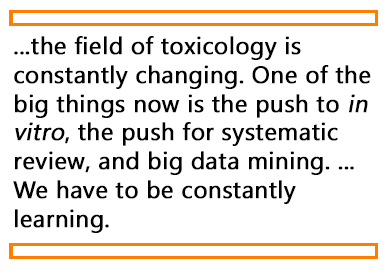
SOT member Dori R. Germolec, PhD, is the leader of the Systems Toxicology Group within the National Institute of Environmental Health Sciences (NIEHS) National Toxicology Program (NTP) in Durham, North Carolina. She earned her MA in physical anthropology from Duke University in 1983 and her PhD in toxicology from North Carolina State University in 1995. She is primarily an immunotoxicologist and has contributed to more than 100 peer-reviewed publications. I spoke with Dr. Germolec about immunotoxicology and her advice on pursuing careers in toxicology.
How did you first become interested in toxicology and, at what point, did you first identify yourself with the field of toxicology?
 I did my master’s work at the Duke University Primate Center [now known as the Duke Lemur Center]. My project involved determining whether a group of lemurs released into a non-native environment—an enclosed forest in North Carolina—could distinguish poisonous plants from non-poisonous ones. In fact, we found (in my first peer-reviewed publication) that lemurs could distinguish tannins and phenolic compounds by smell and chose not to eat plant parts which contained these. As part of my project, I took some of the plants into the lab and was isolating these tannin and phenolic chemicals. That’s really what first sparked my interest in toxicology. Shortly after, I got a technician position with the NIEHS in an immunotoxicology lab. That was my transition to investigating the immune system and toxicology, and it was a natural career progression after that.
I did my master’s work at the Duke University Primate Center [now known as the Duke Lemur Center]. My project involved determining whether a group of lemurs released into a non-native environment—an enclosed forest in North Carolina—could distinguish poisonous plants from non-poisonous ones. In fact, we found (in my first peer-reviewed publication) that lemurs could distinguish tannins and phenolic compounds by smell and chose not to eat plant parts which contained these. As part of my project, I took some of the plants into the lab and was isolating these tannin and phenolic chemicals. That’s really what first sparked my interest in toxicology. Shortly after, I got a technician position with the NIEHS in an immunotoxicology lab. That was my transition to investigating the immune system and toxicology, and it was a natural career progression after that.
How would you describe your work to a junior in high school who has an interest in chemistry, biology, and public health but has not really heard of toxicology before?
They always say that you have to describe what you do to your parents, and that’s how you learn to talk to laypeople. My standard line, in general, is, “I look at the effects of ‘stuff’ on the immune system as an immunotoxicologist.” My specialty is looking at how chemicals, therapeutics, or things in the environment affect our ability to fight infection, resist cancer, or, even more subtlety, affect our ability to resist disease. I always say that it “all comes back to the immune system.” Lots of diseases, including chronic ones, are inflammatory based. For example, many chemicals which cause liver disease acutely actually cause chronic inflammation in the liver and kidney, so understanding inflammation and the responses of the immune system are really at the basis of how we can understand how chemical exposures cause disease.
How would you describe your job at the NTP?
At the NIEHS, I’ve had three different jobs. I started as a research technician in the lab of SOT member Michael Luster, PhD, and then went back to school to complete my PhD. I led a research lab at the NIEHS for about 10 years and then transitioned to the NTP because I wanted to learn more about the aspects of toxicology that I didn’t know as much about: reproductive and developmental toxicology, carcinogenesis, and neurotoxicology, which I’ve learned by osmosis from the folks that I work with, which is really nice.
When you are in a multidisciplinary program like the NTP, you always work in a team environment. It’s all team-based science. For all the projects we design, we at least consider incorporating multidisciplinary studies. It doesn’t always happen that we include every discipline, but we do consider multiple potential avenues for toxic effects. I’ve been very fortunate to be influenced by many different people who work in different disciplines.
Yes, I think that as a graduate student—or scientist at any career stage really—it’s important to not be intimidated by new fields, but always be open to learning about new areas.
And the field of toxicology is constantly changing. One of the big things now is the push to in vitro, the push for systematic review, and big data mining. These are newer topics which likely were not part of school curriculums until recently. We have to be constantly learning. That’s why “fresh blood” is so important.
 One of the things I also think is very important is that not only are you a mentor as you advance through your career, but that you are still being mentored throughout. For me, mentoring works both ways—no matter how senior you are. There are always people who give you really great advice, so you should always be receptive to this advice.
One of the things I also think is very important is that not only are you a mentor as you advance through your career, but that you are still being mentored throughout. For me, mentoring works both ways—no matter how senior you are. There are always people who give you really great advice, so you should always be receptive to this advice.
What would be your advice to graduate students pursuing their degrees in toxicology or another related discipline?
There are myriad career opportunities in toxicology.
Many students coming out of PhD programs in toxicology or related disciplines are involved in highly specific, molecular-based projects. I would encourage graduate students to get as broad an education as they can and at least be familiar with both in vitro and in vivo studies, regulatory toxicology, and risk assessment. Most academic programs don’t offer formal training in regulatory toxicology or risk assessment, but there are other ways to get this type of information. For example, Continuing Education courses through SOT [Editor’s Note: SOT online Continuing Education courses (CEd-Tox) are available for free to SOT Student and Postdoctoral members.], seminars/webinars, and short courses put out by companies that are sometimes in collaboration with academia.
I think that the reality of it is that when you start looking for that first postdoc or that first “real job,” you’ve come out of a very focused environment which may not necessarily prepare you for the realities of the job market, particularly in government and industry. While there are some lab-based positions, unfortunately, those opportunities are becoming more limited. If you are seeking a position in government or industry, they are looking for individuals with some familiarity with risk assessment and regulatory toxicology. It is also true that if you choose to do a non-laboratory postdoc or first position that is not laboratory based, you are in some way cutting yourself off from a future laboratory-based career, so it is important to realize this as you are making that first decision after graduate school.
Describe a situation in which you were faced with a research-based challenge and how you were able to resolve this challenge.
 I was doing research on the effects of arsenic on the skin. It started out as an immunology project, but it morphed into cancer biology. The research was very interesting: We were looking at mechanisms of arsenic-induced skin cancer. There are still many questions that remain, and we were doing our best to address those questions. What happened for me is that the project really led me away from immunology. What I realized over time was that while I was doing really interesting research, it wasn’t what I wanted to be doing, so this kind of forced a career change to get back to immunotoxicology.
I was doing research on the effects of arsenic on the skin. It started out as an immunology project, but it morphed into cancer biology. The research was very interesting: We were looking at mechanisms of arsenic-induced skin cancer. There are still many questions that remain, and we were doing our best to address those questions. What happened for me is that the project really led me away from immunology. What I realized over time was that while I was doing really interesting research, it wasn’t what I wanted to be doing, so this kind of forced a career change to get back to immunotoxicology.
What is one thing that you most enjoy about your job?
The thing I enjoy most about my job is the feeling that toxicologists impact public health. We find out things that have the potential to harm the public. For example, toxicology and personalized medicine are integrating to help pinpoint who is at risk and why they are at risk. This knowledge is important for scientists who need to produce therapeutics or who need to protect crops and how these products might affect individuals. It all comes back to protecting public health and that public service piece. It’s exciting.
I like being in a place where I can work in a team, and we can really get the best out of everyone. We learn a lot and have a lot of scientific interactions so that the product we produce is something which is usable by a lot of people. NTP reports are very scientific, but we also try to make products that are understandable to anyone. The most fun thing is that we’re making an impact.